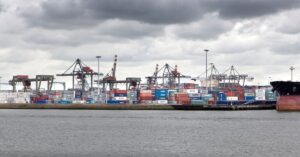
World’s First Fully Electric Intercontinental Fast Ferries Powered By AYK Energy
October 8, 2025
Hanwha Ocean Completes World’s First Ship-to-Ship LNG Transfer During Sea Trials
October 9, 2025

Container traffic at Europe’s largest seaport, the Port of Rotterdam, has been severely disrupted after lashers began a 48-hour strike on Wednesday afternoon (October 8) demanding higher wages.
According to the labour union FNV, employees of International Lashing Services and Matrans Marine Services, the two lashing companies operating within the port, stopped work at 3:15 p.m. local time and are set to continue their strike until the same time on Friday (October 10).
Since lashers are responsible for fastening and unfastening containers to keep them secure on ships, the strike means no container vessels at the port can be loaded or unloaded. A spokesperson for the union said that without lashers, cargo handling at the port comes to a standstill.
The Port of Rotterdam Authority said the strike was likely to impact vessel traffic but stated it was still too early to assess the full extent of the disruption. International Lashing Services and Matrans Marine Services have not yet commented on the situation.
The disruption at Rotterdam port coincides with ongoing industrial unrest in Belgium, where marine traffic at the Port of Antwerp-Bruges has been affected by four days of strikes by Flemish harbour pilots protesting against federal pension reforms.
According to port authorities, Antwerp, which normally handles between 60 and 80 ships each day, processed only 31 vessels on Tuesday. Several ships were delayed or stranded, while others diverted to alternative destinations.
The strikes in Rotterdam and Antwerp have caused significant congestion in two of Europe’s busiest ports, raising concerns about potential impacts on regional trade and supply chains.
The Port of Rotterdam, located in South Holland, the Netherlands, is the largest seaport in Europe and the world’s biggest outside Asia. It held the title of the world’s busiest port by annual cargo tonnage from 1962 until 2004, before being overtaken by Singapore and later by Chinese ports including Shanghai. In 2020, Rotterdam ranked tenth globally in terms of container throughput measured in twenty-foot equivalent units (TEUs).
The port is also working toward cleaner operations, aiming to become emissions-free by 2050. In 2018, it launched a €5 million programme to promote climate-friendly shipping. According to Benchmarkia’s Industrial Park Ranking, Rotterdam Harbour currently ranks 20th worldwide for sustainability.
Reference: Reuters
Source: Maritime Shipping News


